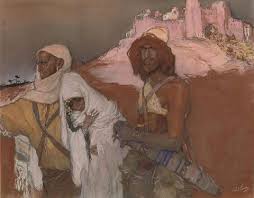Because Their Sister Dinah Had Been Defiled,
Jacob’s Sons Replied Deceitfully
34: 8-17
Because their sister Dinah had been defiled, Jacob’s sons replied deceitfully DIG: Why was Jacob silent during these negotiations? We hear nothing from him.
REFLECT: What does God think about intermarrying with the Canaanites in your city (Second Corinthians 6:14-18)? Why doesn’t the end justify the means here?
The royal family of Shechem approached the Hebrews with a proposal. At first King Hamor did all the talking and said to them: My son Shechem has his heart set on your daughter. Please give her to him as his wife. Hamor offers enticement to Jacob’s family by saying that this marriage will only be the beginning of a close and prosperous relationship between the people of Shechem and Jacob’s family. The marriage between Shechem and Dinah, in other words, will be the first in the right to intermarry. Hamor said: Intermarry with us; give us your daughters and take our daughters for yourselves (34:8-9).
You can settle among us; the land is open to you. Live in it, trade in it, and acquire property in it (34:10). This was an offer of city-state citizenship to Jacob and his family, something that the nomads of this period wanted badly. Abraham and Isaac never received such an offer. As far as the land went, God had already given it to Ya’akov, he didn’t need Hamor to offer it to him. Hamor couldn’t be trusted anyway; he gave a completely different story to his own people later (34:23). He was lying to Jacob and his sons in order to ultimately acquire everything they had. Clearly, nothing good could come from this proposal.
If Shechem had requested his father make the official contact with Ya’akov, it would have been out of place for Shechem to go by himself. So he went with his father and spoke as soon as he had the opportunity.524 Then Shechem, who had been standing quietly beside Hamor, said to Dinah’s father and brothers, “Let me find favor in your eyes, and I will give you whatever you ask” (34:11). For such a barbaric beginning to their relationship, Shechem now appears so proper. But he has no sense of remorse or repentance regarding the rape. No apology was offered. It seems as though he expected them to welcome him with open arms. He was totally clueless. It is as if he expected Dinah’s brothers to say, “Yes, we favor you. All you did was rape our sister. Why should we hold that against you?”
Shechem continued his hopeless appeal: Make the price for the bride and the gift I am to bring as great as you like, and I’ll pay whatever you ask of me. This was payment that the husband paid to the parents for their daughter. In the Near East, the bride price comes not with the bride, but for the bride. Normally, there was a going rate set by the community, but Shechem was willing to go way beyond it. Even though the rape of a prospective bride may have been the norm in the Canaanite civilization, the spoiled prince seemed to think he could buy anything: Only give me the girl as my wife (34:12). He really was romantically attracted, but from the Hebrew perspective, was showing it the wrong way. He had dishonored her and them at every turn.
Shechem must have assumed that he was negotiating from a position of strength. After raping Dinah, he kept her hostage in his house (35:26). The stakes were high. Clearly, this was a very dangerous situation for everyone involved. But Jacob is completely absent from these negotiations. Where was the spiritual leader of the family?

The brothers took the lead in the negotiations, which was not unusual in that society. Earlier, Laban had taken the lead in the negotiations for Rebekah (24:50, 55-59). But instead of taking charge of what was clearly a dangerous situation, Ya’akov allowed his sons to negotiate with the royal family of Shechem.525 Because their sister Dinah had been raped, Jacob’s sons replied deceitfully as they spoke to Shechem and his father Hamor (34:13). The brothers were careful not to show their hand, and as they walked back together from the fields they developed an evil plan.
Not content to leave the city’s judgment to God, as with the cities of Sodom and Gomorrah, Simeon and Levi resolve to take matters into their own hands. They said to the men of the city: We can’t do such a thing; we can’t give our sister to a man who is not circumcised. That would be a disgrace to us for all time. We will give our consent to you on one condition only; that you become like us by circumcising all your males in the city. That would be the condition of intermarriage. Then we will give you our daughters and take your daughters for ourselves. We’ll settle among you and become one people with you. This demand was very believable because at the time some pagans made circumcision a condition of marriage. But if you will not agree to be circumcised, we’ll take our sister and go (34:14-17).
Via the marriage of Dinah, the royal family of Shechem wanted to make a financial offer to the Hebrews that they couldn’t refuse. But they had no idea who they were dealing with, or how much danger they were really in. The conditions set by Jacob’s sons sounded quite fair and upfront, but their proposal dripped with treachery. Their real intent was murder.



Leave A Comment